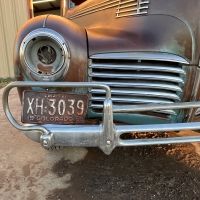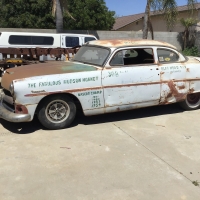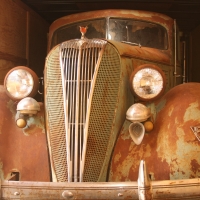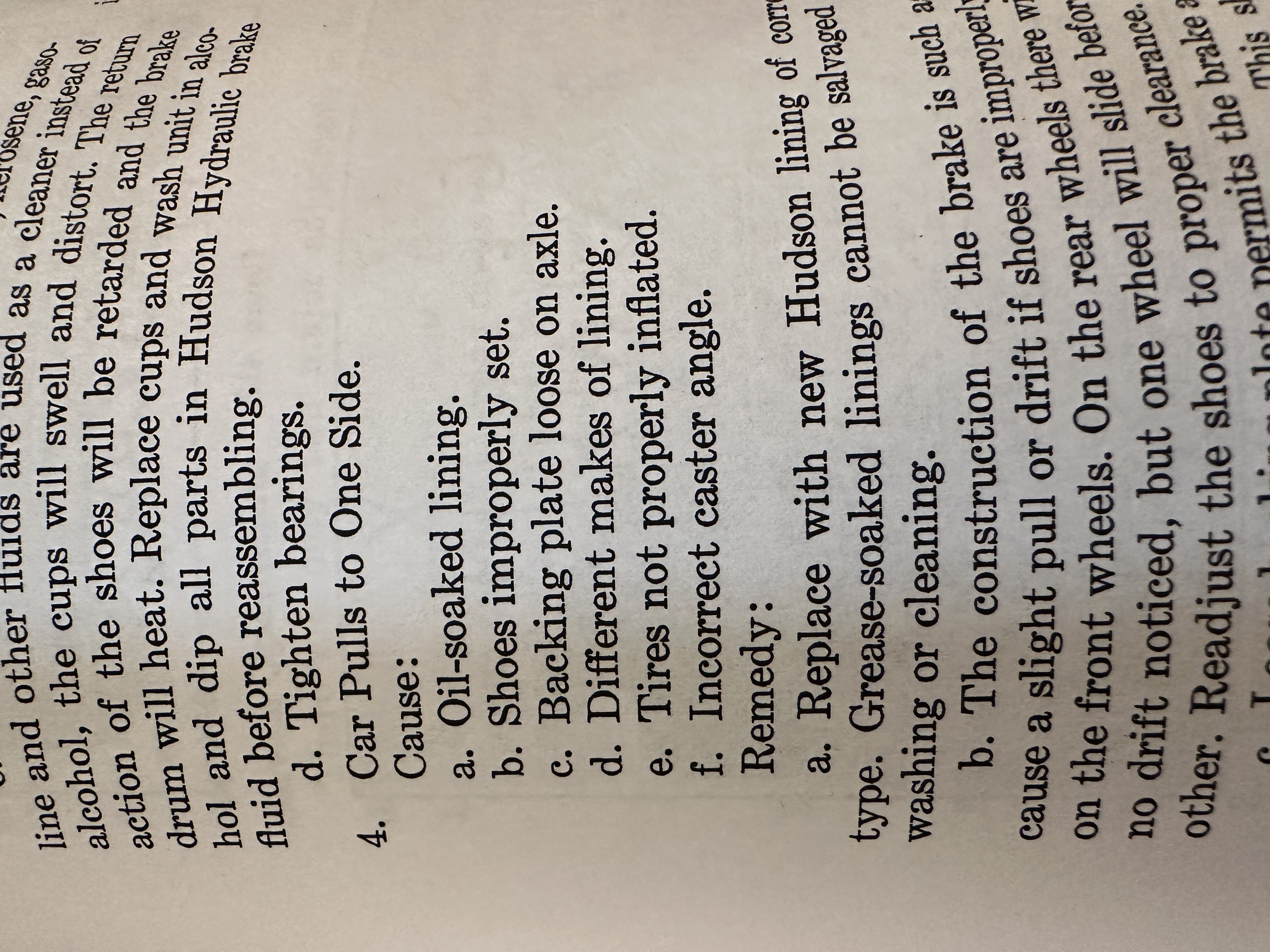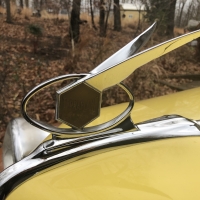Advice Sought on Brake Swerve
I replaced the inner & outer seals on the left and right rear drums, and installed new brake shoes & lining. I replaced the brake drum but at that point got sidetracked doing several repairs to the car. Then, I had the car towed to a commercial garage to have some other things done. I never actually drove the car to see if I'd manage to fix the swerving.
This summer I drove the car home from the garage, and found to my horror that the car still swerved violently to the right whenever I applied the brakes! My "fix" of both rear drums, did not apparently cure the brake problem!
So I pulled both from brake drums, only to discover that there was no problem in either. No sign of oil or brake fluid on any of the brake linings, and no brake fluid leakage in the brake cylinders.
I did adjust the brakes at 4 wheels, by turning the star wheel, and I even equalized the pressure in all four tires.
So, could anyone please offer some suggestions as to the source of my problem? I strongly suspect it was something that happened suddenly; not over a period of days or weeks. When I set off for the cars & coffee, everything was normal. When I returned home the car swerved all of a sudden.
If you could suggest any explanation I would be most grateful. I'd be even more grateful if you could suggest a test of some sort that would confirm your suspicions, rather than having me simply replace one part after another, chasing a possible solution! Thanks in advance for offering your theories!
Comments
-
Jon, have you done a sudden stop on loose gravel to determine which (or if) one brake is not functioning properly?
closest to a skid plate that I could think of.
regards, Tom0 -
If that’s not feasible, jack the car up, have some one push on the brake pedal while you rotate each wheel to check for operation. You might not have a hydraulic leak but maybe a wheel cylinder that is seized.0
-
Did you replace the lining? It is most likely still impregnated with oil, which will make it grab. You didn't say if you replaced the inner seal, because that is where the oil will be coming form.0
-
Thanks for all your good ideas.
Geoff, after the initial "swerve" in spring of '22, I pulled rear drums, found rear axle grease leak in right drum, and replaced inner & outer seals and brake shoes in both left & right drums. I then test-drove car and got same swerve to right. So I checked both front drums, found no leakage of brake fluid or grease. Wiped off linings with brake cleaner anyway. Test-drove car and got same swerve.0 -
My Jet was doing the same, and it was the front piston stuck in the slave cylinder. Look in through the inspection plate and get someone to pump the pedal, and see if the shoes are both moving. If swerving to the right it will be the left brake that is not working.0
-
I had a similar issue one time with my 52 Wasp. The flex line to the right front wheel was deteriorated inside, and the hole was closed up. They looked to be in fine condition on the outside. You could apply the brakes, and fluid would pass through, but it did not return as far as the other side, so the next time I applied the brake, the right side grabbed much quicker. If you haven't replaced all three flex hoses in the last five years, I would do them all now.0
-
Geoff, thanks for that tip! That inspection hole trick beats having to remove one or both front brake drums. Also, if it's too dark to see through that little triangular hole in the drum, I can just stick a feeler gauge into the hole and -- if the brake lining captures it when depressing the pedal -- that means the wheel cylinder piston isn't stuck. By the way: to what extent would a problem with one of the rear wheel brakes, cause swerving? In other words, is it usually a problem with one of the front wheel brakes, that would cause violent swerving when applying the brakes?0
-
54coupe, according to Geoff, if car swerves to right, the left brake piston is stuck.
In your case, a defective hose (right front) whose interior had collapsed, caused that (right) brake to engage sooner than the left front brake, causing a swerve. So...which way did the car swerve? Left? Right?0 -
It swerved right.... Either way, if they haven't been replaced recently, I would do so. All of them.0
-
Thanks for your ideas, 54coupe. I had replaced the wheel cylinders, shoes and hoses on both front wheels, 5 or 6 years ago, with factory-new replacements. But I guess anything can fail, no matter how new.0
-
Jon, did you figure out the issue? After reading through this cliffhanger I was curious about the outcome.
0 -
Thanks for your interest. I never did figure it out, and the car has been sitting since last summer when I got it back from the mechanic's garage. I don't have a place to work on it and have too many other irons in the fire to fool with it.
Just found a nearby mechanic, last week, who is interested in working on it. He'll trailer it to his garage next week. The first thing we'll try is to replace all three brake hoses, since that's practically the only brake part that hasn't been replaced yet! Maybe the master cylinder too, it's been several decades since I replaced the previous one.
0 -
To continue the saga: the mechanic today discovered that the rear brake hose (that services the two rear brakes) is totally clogged. So no brake fluid is getting to the rear wheel cylinders from the master cylinder. Also, he will install a new master cylinder (the old one was installed 30 or more years ago). Also, the adjustment on the two front brake shoes didn't match.
A week after writing this I attempted to install two new front wheel cylinders, but the new hoses didn't seal with the cylinders, and the connection leaked.
So we replaced the two front cylinders and hoses -- which don't leak -- and tried a test drive. Car swerved to the right again.
I've ordered brand new wheel cylinders and hoses (coming from an authentic Hudson parts dealer) and as soon as they come in, I'll install them to see what happens.
Meanwhile I'm wondering: could there be something wrong with the front suspension or steering? The sudden shock of jamming on the front brakes, could possibly stress the steering or suspension, causing the car to swerve to the right. (In other words, the brake cylinders and hoses might in fact be functioning correctly.) The mechanic and I will do a careful inspection when the car's up on the lift.
1 -
What dot brake fluid do you use? Could that have contributed to the clog? Or is it just the age of the master cylinder. Interesting that clog occurred at the rear brake host. Is there a bottleneck there?
0 -
I use DOT 5 (silicone), have done so for 30 years. Master cylinder is old, the mechanic just installed a new on today. Thanks for your thoughts.
0 -
It's now a year since my last post. After all the improvements that the mechanic made, it seemed that the problem was finally solved. No more swerve. But then one day, on my way to a car show, the car pulled to the right when I hit the brakes. I decided that it would be prudent to ditch the Terraplane, and drive my trip in my Brand-X. I turned around to drive home, but almost immediately discovered that the swerve had gone away again! So, I got back on the road and continued to head for the meet. The rest of the day was "swerve-less". Since that time, the brake swerve has returned, then gone away, and so forth.
One possible solution is silicone in the old brake linings. (i.e.: one lining with silicone on it, slips; the other one doesn't.) My mechanic had cleaned them well with brake cleaner at the time of the repairs, a year ago,, and that seemed to work then. (Remember: I'm using liquid silicone Dot 5, not regular brake fluid). But it could be that the silicone soaked into the linings. Anyway, I've obtained some N.O.S. linings and may have my mechanic install those, in hopes that it may completely get rid of the problem once and for all!
I'll keep you posted.
0 -
Jon,
I don't think there is any solvent that will thoroughly dissolve/clean silicone residue, especially if it has soaked into the brake linings. Make sure that your mechanic loosens the anchor bolt that holds the brake cylinder to the backing plate and that it moves freely to ensure that the new shoes will center on the drum. While the wheel cylinder is loose turn the star wheel to expand the shoes out to the drum, then tighten the wheel cylinder bolt. After that, back the star wheel off so that there is just a very slight drag of the shoes on the drum.
Are your NOS linings asbestos? You can always have your current brake shoes relined with modern material. If you don't have a local shop you could probably have them sent out to a shop elsewhere.
John Forkner
I'm not always right so other opinions are welcome.
0 -
John, thanks for your suggestion. I neglected to return to the forum for your reply, until this moment.
Tomorrow morning, my mechanic will be mounting brake shoes with N.O.S. linings, on the front two wheels. At that time I will be sure to pass along your info to him before he begins work.
You suggest centering the shoes by loosening the "anchor bolt that holds the brake cylinder to the backing plate", then adjusting the star wheel. I thought that each wheel cylinder was held to the backing plate with two screws, not one? If so wouldn't that mean the wheel cylinder position can't be adjusted?
I vaguely recall some advice in the shop manual, about centering the brake shoes on the drum by loosening the anchor pin at the top of the backing plate.
Again, many thanks for your suggestion, and I would be grateful for your thoughts on the brake cylinder adjustment!
0 -
Well, it appears that I've solved my "swerving" problem, by replacing the soaked brake drum linings with new ones. When I last worked on the problem a few months ago, we replaced all sorts of brake components, but couldn't lay our hands on the correct brake shoes. In the end I found a fellow in rural Virginia who had modern lining in stock and the equipment with which to attach it. I'd be happy to pass his name along to anyone who's interested. In fact, I can also recommend a lady in Pennsylvania who has the equipment to reline brake shoes, and who has several types of modern and traditional linings to choose from.
It's getting scary out there. There are fewer and fewer vendors out there who are knowledgeable about old-car technology.
It's a real "plus" when you find one of these people in your own backyard (as I did), so you can drop the old shoes off one day, then pick them up two or three days later!
0 -
Jon: Update your vendor list with the names of the vendors you have discovered. I have recommended a fellow just down the road from me (Bruceville/Eddy, TX), and he now receives inquiries from all over the US and Europe. Keep these vendors alive with business.
0 -
I was reading through the MPM this weekend and found this. How ironic…
Jeremiah
0 -
John
The person In Pennsylvania does not have the expertise to do brake linings. Since she lost her husband, her nephew and such ain’t got the skill sets. She refunded me for the mess they made of my shoes several years ago (pre-Covid)
0
Categories
- 37K All Categories
- 117 Hudson 1916 - 1929
- 21 Upcoming Events
- 96 Essex Super 6
- 28.6K HUDSON
- 576 "How To" - Skills, mechanical and other wise
- 995 Street Rods
- 151 American Motors
- 181 The Flathead Forum
- 49 Manuals, etc,.
- 78 Hudson 8
- 44 FORUM - Instructions and Tips on using the forum
- 2.8K CLASSIFIEDS
- 610 Vehicles
- 2.2K Parts & Pieces
- 78 Literature & Memorabilia
- Hudson 1916 - 1929 Yahoo Groups Archived Photos
